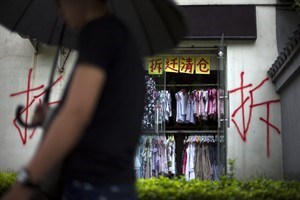
A pedestrian holds an umbrella in a rain while walking past a clothing store with a written note on the window, which reads "Relocaiton Sale: Everything Must Go," near Beijing's Financial Street, China, Tuesday, July 31, 2012. Chinese characters "chai" are marked on the wall to indicate the building is to be dismantled. China has deployed new tools to fight its economic slump, holding down its exchange rate and promising still more stimulus spending, as struggling companies look for signs of a recovery. (AP Photo/Alexander F. Yuan)
July 31, 2012 - 8:07 AM
BEIJING, China - China's top leaders warned Tuesday that economic growth could slow further and called for more efforts to boost weak domestic demand.
The warning suggested Beijing might roll out still more stimulus measures despite private sector forecasts that say growth should rebound in coming months. Analysts say China's deepest slump since the 2008 crisis probably has bottomed out, but communist leaders worry about job losses and possible unrest.
"Economic downward pressure is still relatively large," said Premier Wen Jiabao at a government seminar, according to the official Xinhua News Agency.
Growth fell to a three-year low of 7.6 per cent in the three months ending June 30. Analysts say it easily should hit the government's target of 7.5 per cent for the year. But some industries such as shipbuilding have been hit much harder, with revenues down by half.
President Hu Jintao, in a rare public comment about the economy, called for officials to closely watch developments abroad and improve China's ability to cope with shocks, according to Xinhua.
The government must "improve policies and measures to increase the support of fiscal and monetary policies on the real economy and efforts to expand domestic demand," Hu was quoted as saying.
The report gave no details of possible new initiatives. Beijing has launched a flurry of stimulus measures over the past four months including higher investment by state companies and more spending on building low-cost housing.
Any further setbacks for the world's second-largest economy could have global repercussions, hurting demand for oil, iron ore, industrial components and other goods from Southeast Asia, Australia, Africa and elsewhere.
The Cabinet said Monday it will boost this year's spending on railway construction and launch projects aimed at attracting more private sector investment in state-dominated industries such as energy, finance and telecoms. News reports said Beijing is considering tax rebates to steel exporters. That followed Friday's announcement by the government of the central city of Changsha of plans to spend 829.2 billion yuan ($130 billion).
On Tuesday, Wen warned the global slowdown that has battered Chinese exporters "could last a very long time," Xinhua reported.
Beijing is trying to help exporters that employ millions of Chinese workers by holding down the exchange rate of its tightly controlled yuan, though how much that might help is unclear due to weak global demand. The yuan has declined by about 1 per cent against the dollar this year.
The government has announced a target of boosting trade by 10 per cent this year despite weak global demand and says exports were up 9.2 per cent in the first half of 2012 over a year earlier.
The industry ministry is considering measures to encourage steel exports by refunding a 17 per cent value-added tax, newspapers said Thursday, citing unidentified government sources.
Such measures raise the risk of clashes with Washington and other governments that are trying to increase their own exports to cut unemployment.
Private sector analysts and the International Monetary Fund say the slump probably bottomed out in the three months ending June 30, though the timing of a recovery is unclear.
"Conditions are now gradually improving," said Moody's Analytics economist Alaistair Chan in a report.
Last week, the Ministry of Industry and Information Technology said output was stabilizing but growth was weak.
Struggling Chinese companies are still looking for signs of a recovery.
Monthly sales at Da Ben Xiang, a company in the southern city of Guangdong that sells cleaning cloths for jewelry and electronics, have dwindled by 40 per cent since April, said a salesman there. He would give only his surname, Ye.
"I can't tell now whether the situation will get better. Maybe in September," Ye said.
Beijing has moved cautiously after its huge stimulus in response to the 2008 global crisis helped China rebound quickly but fueled inflation and a wasteful building boom. The government has resisted pressure to ease controls imposed on housing sales to cool surging prices.
"We would not be holding our breath for another big stimulus," said UBS economist Tao Wang in a report Tuesday.
Even spending by local governments such as Changsha might turn out to be smaller than announced, Wang said.
"The many regional stimuli are largely wishful thinking of local governments," she said. Projects have to be financed with bank loans and "credit policy is still closely managed by the central government."
Real estate showed signs of a possible recovery in June. The government said prices rose in 25 of the 70 biggest cities compared with the previous month. That was an increase over May, when just six cities had price rises.
"The number of transactions has gone up since May," said Xu Peng, a real estate agent in Beijing. "But I don't think the number will keep going up, and it will drop this year."
Authorities have refrained from talking about the timing or size of a rebound, possibly to avoid a public backlash in the event of setbacks.
Leaders including Wen, the premier, have promised more bank lending and other support for entrepreneurs who generate most of China's new jobs. But private businesspeople say they have gotten little help.
"The government policy has never been helpful," said Ye, the salesman. "Just slogans."
___
AP researcher Flora Ji in Beijing contributed.
News from © The Associated Press, 2012